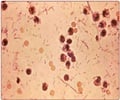Uncomplicated Malaria
Symptoms of Uncomplicated Malaria
- Chills
- Sweats
- Headaches
- Nausea
- Vomiting
- Body aches
- General malaise
The symptoms of Malaria consist of three stages -
- Cold stage - symptoms of cold, shivering
- Hot stage - fever, headache, vomiting
- Sweating stage - sweating
The symptoms vary depending on type of malarial strain
Common conditions associated with Malaria are -
- Fever
- Weakness
- Enlarged spleen
- Enlarged liver
- Mild jaundice
- Increased sweating
Diagnosis of Uncomplicated Malaria can be done by some blood tests -
- Microscope examination of blood smears for malarial Parasites
- Mild anemia
- Decrease in blood platelets
- Urine test may show
- increase in bilirubin concentration
- Increase in aminotransferase
- Detection of albumin
Mild Malaria
Symptoms of Mild Malaria is -
- Fever
- Chills
- Sweats
- Headaches
- Nausea and vomiting
- Body pain
The Symptoms of Malaria attack occurs in three stages and lasts for 6 to 10 hours
- Cold stage - Cold, shivering
- Hot stage - Fever, headache, vomiting
- Sweating stage - sweat, fever, tiredness The frequency of symptoms occurs every - Second day with P. falcipuram, P. ovale and P. vivax
Third day with P. malariae.
Severe Malaria : Severe malaria is a serious infection and requires immediate treatment and hospitalization.
Severe Malaria is due to complications following P. falciparum infections involving serious organ failures.
Clinical manifestations of severe malaria are -
- Cerebral malaria
- Loss of consciousness
- Brain seizures
- Coma
- Abnormal behavior
- Neurological abnormalities
- Severe anemia
- Hemoglobinuria - Loss of hemoglobin in urine.
- Pulmonary edema
- Acute respiratory distress syndrome
Clinical manifestations of severe malaria are -
- Decrease in blood platelets or Thrombocytopenia
- Cardiovascular collapse
- Shock
- Kidney failure
- Low blood glucose
- More severe manifestations in Immuno-suppressed patients.
Malarial Relapse
- Malarial relapse of P. vivax and P. ovale infections occurs in patients who have recovered from illness and may suffer from several relapses which may occur after months or even years after earlier infections.
- Malarial drugs prevent symptoms of malaria but do not prevent relapses of infection caused by strains of the parasite that have a persistent liver phase.
- Relapses occur due to reactivation of dormant parasites which are present in the liver.
- Complete treatment to avoid relapse attack during the vary first infection can help in avoiding relapses.
Other Manifestations of Malaria ?
Neurological Manifestations
- Speech difficulties
- Ataxia (difficulty in movements)
- Deafness
- Blindness
- Increased sweating
Recurrent infections of P. falciparum affected children can lead to anemia. During pregnancy malaria can cause -
- Premature delivery
- Sweats
- Low birth baby
- Acute Respiratory Distress Syndrome (ARDS)
- Nephrotic syndromes or loss of protein in urine
- Malarial Splenomegaly - Spleen enlargement
- Susceptibility to other infections














